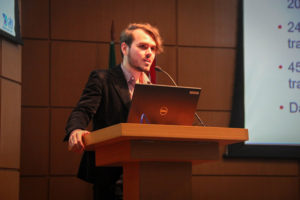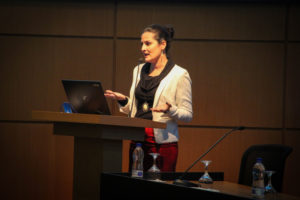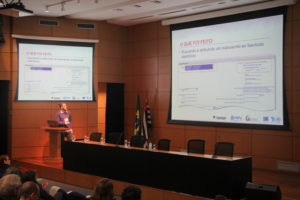By Alex Mendonça
The III SciELO-ScholarOne Updating Course took place on August 18 at the Governador Carlos Alberto de Carvalho Pinto Auditorium of FAPESP, in São Paulo. The annual event aims to improve the processes that control the quality of articles published by SciELO journals that use the ScholarOne online manuscript management tool from Clarivate Analytics. About 150 representatives from 70 journals, among them editors-in-chief, members of the editorial staff and scholarly communication professionals were present.
The SciELO Program makes a major investment to provide this service and the course contributes at improving its use, socializing updates, as well as reinforcing recommendations and good editorial practices in line with SciELO’s lines of action of professionalization, internationalization and financial sustainability of Brazil’s journals.
Complying with an indexing criterion, all journals of the SciELO Brazil Collection use one of the certified manuscript management systems. Among the 285 indexed journals in August 2017, 131 journals (46%) use the ScholarOne system on a regular basis. The second most used system is the Open Journal System (OJS), offered in different platforms, with 41% of adoption. Other systems account for 13% of the journals. The OJS system operated by SciELO is used by 17.5% of the journals and the other 23.5% use OJS versions operated by university portals or by their own facilities. Thus, the manuscript management services provided by SciELO Brazil Collection cover 63% of indexed journals in the collection, which receive training, follow-up, technical support and, in the case of OJS, hosting and maintenance.
The topics that permeated the discussions of this course’s third edition were the persistence and normalization of data that feed the assessment process of the articles. Persistence is essential to ensure that the data entered into the evaluation process is duly recorded and available at the end. Standardization, on the other hand, is essential to ensure that the data follow standards and are consistent across articles and journals to ensure functionality and interoperability with information systems. To that end, ScholarOne interoperates with ORCID in the disambiguation of researchers, with Ringgold in the normalization of research institutions, and with FundRef in the standardization of research funding institutions. These data, collected and validated by ScholarOne in the submission process, are embedded in XML texts and persist until the end of an article’s publication flow.
Ana Heredia, the Regional Director of ORCID for Latin America and Spain, addressed the cycle1 of validated data exchange between researchers, affiliated institutions, funding agencies and publishers that guarantee the researcher’s identity. For this cycle to materialize, Heredia emphasized the importance of the editorial process of collecting the ORCID record and publishing it at the final article, again alluding to the data persistence. Currently, all SciELO journals that use ScholarOne optionally collect the authors’ ORCID record. However, there are yet only a small number of journals that require authors to provide their ORCID IDs at article submission, and an increasing number of journals are expected to systematically publish the ORCID register next to the authors’ affiliation, following an international trend.
A mini workshop on the use of the CrossRef Similarity Check, used to verify the originality of papers submitted to journals, was also included in the course program. Providing access to a database of 150 million journal articles and theses, the tool helps academic publishers to ensure the quality of contents. It is worth mentioning that ScholarOne integrates with CrossRef Similarity Check.
The workshop was given by Marina Prado, manager of Turnitin Brazil, the company that provides the submission tool in Brazil, and addressed content filtering techniques, good practices and recommendations to reports interpretation. Up to August 2017, at least 25% of SciELO Brazil journals already use a non-original content detection tool, and the expectation is that this number will increase in the coming months. Since May 2016, the SciELO Program makes it possible to journals whose DOI identifier is provided by SciELO to use CrossRef Similarity Check.
For the first time in the three editions of the course, case reports were presented by members of the journals’ editorial teams that use ScholarOne provided by SciELO. It is a way of sharing experiences, ideas and different suggestions on how to use system resources for other journals attending the meeting.
Rafael Grillo, from Pesquisa Veterinária Brasileira, showed how the system’s personalized reports are used by the journal to control articles accepted for publication. A few months before the course, Grillo had also suggested the creation of a discussion group of SciELO journals that use ScholarOne. Launched in June 2017, the group has currently 87 members and fosters collective learning. The expectation is that most journals using the system will join the group in the near future.
Ricardo de Oliveira Lima, from Revista Latino-Americana de Enfermagem, presented in detail how ScholarOne was implemented in the journal routine, the challenges and benefits acquired, such as automation of tasks, reduction of processing time, reduction of costs with printing and greater process control. The journal had been recognized in the 2015 edition of the course for its commitment and exemplary use of ScholarOne.
As in previous editions, a section of the course syllabus was dedicated to the exploration of Cognos, a tool integrated to ScholarOne which allows the preparation of reports and statistics on the manuscript assessment flow. It is a continuing effort by the SciELO Program to enable journals to generate reports that contribute to improved editorial flow management and report on specific needs, assisting internal evaluations, account reporting to funding agencies, and reporting the journal’s readership about its editorial performance. The SciELO Program intends to carry out a series of Webinars on the subject over the next year, as a continuation of the discussions already carried out in this and previous courses. An advanced course proposal for the Cognos tool is also being considered.
Closing the program, participants were informed firsthand about the updates expected in the next versions of ScholarOne. Among them, the launch of the Portuguese and Spanish versions of the system, scheduled for November 2017, is noteworthy. The Portuguese version is being reviewed by the SciELO Team to ensure that the terminology is in line with the Brazilian status.
Many journals that participated at the event have already started applying the suggestions and recommendations proposed in the course.
Considering the successful experiences of the three editions of the course, the expectation is to continue organizing these meetings annually, always aligned with the principles and objectives of the SciELO Program. At the same time, SciELO is cooperating with the Public Knowledge Project (PKP) to improve the new version of OJS to meet the needs of SciELO journals.
Note
1. HEREDIA, A. ORCID: Open Research & Contributor ID. In: III Curso de Atualização SciELO-ScholarOne, São Paulo, 2017. 62 slides. [viewed 24 August 2017]. Available from: https://www.slideshare.net/scielo/orcid-iii-curso-de-atualizao-scieloscholarone
References
HEREDIA, A. ORCID: Open Research & Contributor ID. In: III Curso de Atualização SciELO-ScholarOne, São Paulo, 2017. 62 slides. [viewed 24 August 2017]. Available from: https://www.slideshare.net/scielo/orcid-iii-curso-de-atualizao-scieloscholarone
LIMA, R.O. Relato de caso – Revista Latino-Americana de Enfermagem. In: III Curso de Atualização SciELO-ScholarOne, São Paulo, 2017. 16 slides. [viewed 24 August 2017]. Available from: https://www.slideshare.net/scielo/relato-de-caso-revista-latinoamericana-de-enfermagem-iii-curso-de-atualizao-scieloscholarone
MENDONÇA, A. ScholarOne e os Critérios SciELO. In: III Curso de Atualização SciELO-ScholarOne, São Paulo, 2017. 17 slides. [viewed 24 August 2017]. Available from: https://www.slideshare.net/scielo/scholarone-e-os-critrios-scielo-iii-curso-de-atualizao-scieloscholarone
MENDONÇA, A. The advanced management of manuscript evaluations was the focus of the first ScholarOne refresher course at SciELO [online]. SciELO in Perspective, 2015 [viewed 24 August 2017]. Available from: http://blog.scielo.org/en/2015/08/17/the-advanced-management-of-manuscript-evaluations-was-the-focus-of-the-first-scholarone-refresher-course-at-scielo/
MENDONÇA, A. Usage improvements and system’s new features were the main topics of the II SciELO-ScholarOne Updating Course [online]. SciELO in Perspective, 2016 [viewed 24 August 2017]. Available from: http://blog.scielo.org/en/2016/10/05/usage-improvements-and-systems-new-features-were-the-main-topics-of-the-ii-scielo-scholarone-updating-course/
PRADO, M. Interpretando relatórios anti-plágio. In: III Curso de Atualização SciELO-ScholarOne, São Paulo, 2017. 5 slides. [viewed 24 August 2017]. Available from: https://www.slideshare.net/scielo/interpretando-relatrios-antiplgio-iii-curso-de-atualizao-scieloscholarone
SANT’ANA, R.C.G. Relato de caso. In: III Curso de Atualização SciELO-ScholarOne, São Paulo, 2017. 11 slides. [viewed 24 August 2017]. Available from: https://www.slideshare.net/scielo/relato-de-caso-pvb-iii-curso-de-atualizao-scieloscholarone
External links
CrossRef Similarity Check – <https://www.crossref.org/services/similarity-check/>
FundRef – <https://www.crossref.org/services/funder-registry/>
I Curso de Atualização SciELO-ScholarOne – <http://eventos.scielo.org/iscielo-scholarone/>
II Curso de Atualização SciELO-ScholarOne – <http://eventos.scielo.org/iiscielo-scholarone/>
II Curso de Atualização SciELO-ScholarOne – <http://eventos.scielo.org/iiiscielo-scholarone/>
ORCID – <http://orcid.org/>
Ringgold – <https://www.ringgold.com/>
ScholarOne Manuscripts – <http://scholarone.com>
Turnitin – <http://turnitin.com/>
Translated from the original in Portuguese by Lilian Nassi-Calò.
Como citar este post [ISO 690/2010]:




















Read the comment in Spanish, by Javier Santovenia Diaz:
http://blog.scielo.org/es/2017/08/29/persistencia-y-normalizacion-de-los-datos-dominaron-la-agenda-del-iii-curso-de-actualizacion-scielo-scholarone/#comment-41202